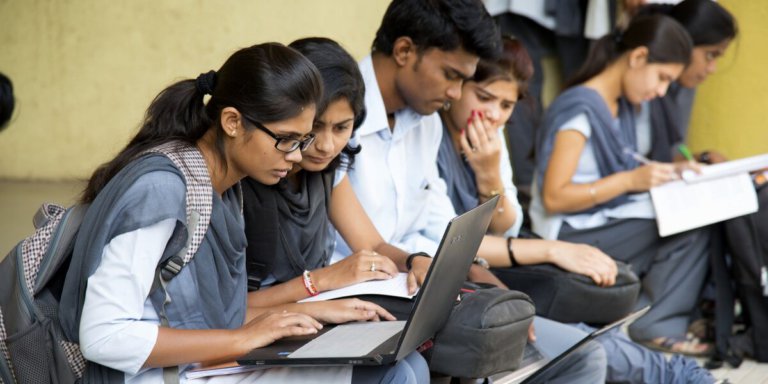
A new university, SRM University Andhra Pradesh (SRM AP), opened in India in 2017 after being built from scratch in just five months. But that’s not all that’s impressive about this university.
This university is disrupting the higher education sector in India, which is generally not keeping up with changing times as fast as other countries.
Shobhit Mathur, co-founder and dean of Rashtram School of Public Leadership, recently wrote in an Opinion piece on Entrepreneur: “The Indian higher education sector is one of the largest in the world with more than 51,000 institutions.
“While this has increased access to higher education, the quality remains poor—low employability of graduates, outdated and globally irrelevant curriculum, poor quality of teaching, crumbling infrastructure and non-existent research, among others.”
He also pointed out that approximately half of the enrolment in higher education in India is in three degrees – arts, science and commerce – that are run through colleges affiliated with universities with a limited scope of innovation.
He further stated that India needs “autonomous higher education institutions that have the power to constitute their own curriculum and take independent decisions on academic matters,” and suggests that these institutions should design innovative new degree programmes that develop future leaders, instead of relying on the traditional three-year degree that has “outlived its utility”.
As India’s universities struggle to play catch-up, and students deal with increasing academic and mental health issues brought on by competitive and rigorous academic programmes that may not adequately prepare them for the future world of work, SRM AP is doing everything differently.
The university in Andra Pradesh, India is driven by an ambition to become a global leader in higher education as well as to home-grow local talent and keep them in the country. India is one of the major exporters of local talent, leading to brain drain in the country.
Every time a Nobel laureate from India wins it in US, it’s time for us think about our higher education institutions. We have let brain drain happen for decades now. Time to reverse the trend. #AbhijitBanerjee
— Prudhvitej (@prudhvitej157) October 15, 2019
Embracing the arts
While higher education in India and in many other Asian countries still focus mainly on STEM fields, SRM AP places more emphasis on the power of humanities when designing their own curriculum.
According to NPR, the university made bold moves by including an entire school of liberal arts – something that doesn’t exist at the majority of universities in India.
That doesn’t mean that the university is not offering STEM-related majors, but rather, allowing all students to have a more well-rounded academic experience with the chance to take electives outside their majors – similar to the US higher education experience.
Students in engineering and computer science at this university take electives in subjects like rhetoric, theatre and gender studies.
Fostering entrepreneurial spirit
Gaming workshop at #SRMUniversity got students and professors excited equally. The workshop held in collaboration with Kaajani University, Finland aimed at teaching students the entire journey of turning a game into a viable business idea. https://t.co/B5BdgSjuJ1
— SRM Amaravati (@SRMAmaravati) July 1, 2018
Universities in the West, and even some in Asia, are encouraging students to think innovatively and develop an entrepreneurial mindset, but India’s universities are lagging behind.
Aayusi Biswas, a 20-year-old engineering student who has previously studied abroad at UC Berkeley, said, “The way this university promoted entrepreneurship is something I’ve never seen before at Indian colleges.”
The ENNOVAB – short for the “Entrepreneurial Innovation Lab,” is a student-led ecosystem that is shaping budding entrepreneurs in the university.
According to the website, “New members of Ennovab driven by the goal are mentored through the various stages of startups – ideation, validation, market research, business model construction and finally, venture capitalist presentations. Case studies, brainstorming sessions are a common practice as Ennovab members meet.”
“Some of the other crucial aspects of the startup journey are networking and making pitches. Through Pitch Days and Founders speed dating events, Ennovab gives its members a taste of what to expect as they venture out into the world of entrepreneurs. Talks by startup heads and gurus, give them insights to navigate their challenging and exciting realm of startups.”
Exposing students to new technologies
The university also frequently holds coding hackathons, which also place students in India at the forefront of cutting-edge technologies – essential as we enter the Fourth Industrial Revolution.
Besides the university’s state-of-the-art water catchment system, solar panels and labs full of high-tech equipment, there is also the Next Tech Lab, which was founded at a different SRM campus four years ago.
SRM AP’s Next Tech Lab requires students to bring their laptops and gather at long tables in the main campus building while working on a wide range of coding projects.
Biswas took third place in a hackathon with an AI-fueled tutoring platform and is currently working on a programme using algorithms designed for genetics to automatically generate designs for suspension bridges.
Liked this? Then you’ll love…
Why Indian universities are watching students’ social media accounts
Degrees from UK universities boost the careers of Indian graduates







